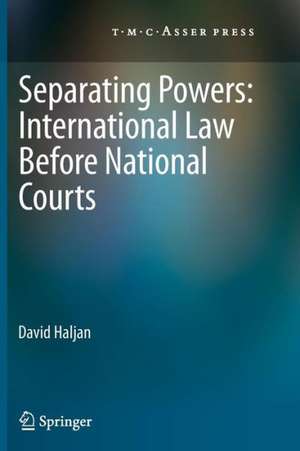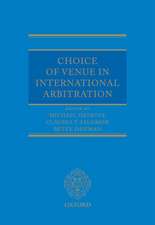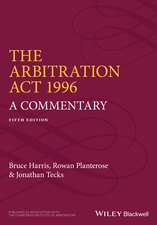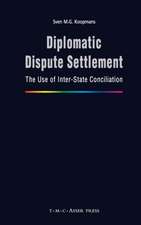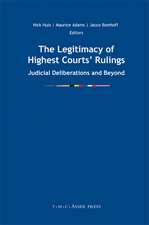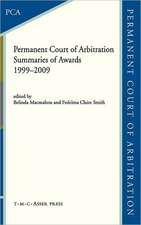Separating Powers: International Law before National Courts
Autor David Haljanen Limba Engleză Paperback – 8 noi 2014
| Toate formatele și edițiile | Preț | Express |
|---|---|---|
| Paperback (1) | 631.86 lei 6-8 săpt. | |
| T.M.C. Asser Press – 8 noi 2014 | 631.86 lei 6-8 săpt. | |
| Hardback (1) | 637.97 lei 6-8 săpt. | |
| T.M.C. Asser Press – 30 oct 2012 | 637.97 lei 6-8 săpt. |
Preț: 631.86 lei
Preț vechi: 743.37 lei
-15% Nou
Puncte Express: 948
Preț estimativ în valută:
120.98€ • 125.98$ • 100.38£
120.98€ • 125.98$ • 100.38£
Carte tipărită la comandă
Livrare economică 14-28 februarie
Preluare comenzi: 021 569.72.76
Specificații
ISBN-13: 9789067049580
ISBN-10: 9067049581
Pagini: 340
Ilustrații: XIV, 326 p.
Dimensiuni: 155 x 235 x 18 mm
Greutate: 0.48 kg
Ediția:2013
Editura: T.M.C. Asser Press
Colecția T.M.C. Asser Press
Locul publicării:The Hague, Germany
ISBN-10: 9067049581
Pagini: 340
Ilustrații: XIV, 326 p.
Dimensiuni: 155 x 235 x 18 mm
Greutate: 0.48 kg
Ediția:2013
Editura: T.M.C. Asser Press
Colecția T.M.C. Asser Press
Locul publicării:The Hague, Germany
Public țintă
ResearchCuprins
Making Introductions.- International Law and the Separation of Powers.- Treaties and Law-Making Power.- Customary International Law and Judicial Power.- Separating Powers?.
Textul de pe ultima copertă
The more international law, taken as a global answer to global problems, intrudes into domestic legal systems, the more it takes on the role and function of domestic law. This raises a separation of powers question regarding law-making powers. In this book the author considers that specific issue.
In contrast to other studies on domestic courts applying international law, the author’s constitutional orientation focusses on the presumptions concerning the distribution of state power. He collects and examines relevant decisions regarding treaties and customary international law from four leading legal systems, the US, the UK, France, and the Netherlands. Those decisions reveal that institutional and conceptual allegiances to constitutional structures render it difficult for courts to see their mandates and powers in terms other than exclusively national. What follows is a constitutional asymmetry between international law and national law generating an inevitable dualism which cannot necessarily be overcome by express constitutional provisions accommodating international law. The separation of powers thus frames the two principal horizons for any future, practicable attempts at integrating of the two legal orders. Either established concepts of constitutional law and constitutionalism will have to be revised, or what international law may do within a municipal legal system will have to be recalculated.
This book offers new insight and new approaches in dealing with international law questions before domestic courts. It is an interesting work of reference and a basis for further debate on this topic among academics and practitioners in the fields of international and constitutional law.
David Haljan is a Senior Research Fellow with the Institute of Constitutional Law, University of Leuven
In contrast to other studies on domestic courts applying international law, the author’s constitutional orientation focusses on the presumptions concerning the distribution of state power. He collects and examines relevant decisions regarding treaties and customary international law from four leading legal systems, the US, the UK, France, and the Netherlands. Those decisions reveal that institutional and conceptual allegiances to constitutional structures render it difficult for courts to see their mandates and powers in terms other than exclusively national. What follows is a constitutional asymmetry between international law and national law generating an inevitable dualism which cannot necessarily be overcome by express constitutional provisions accommodating international law. The separation of powers thus frames the two principal horizons for any future, practicable attempts at integrating of the two legal orders. Either established concepts of constitutional law and constitutionalism will have to be revised, or what international law may do within a municipal legal system will have to be recalculated.
This book offers new insight and new approaches in dealing with international law questions before domestic courts. It is an interesting work of reference and a basis for further debate on this topic among academics and practitioners in the fields of international and constitutional law.
David Haljan is a Senior Research Fellow with the Institute of Constitutional Law, University of Leuven
Caracteristici
The first major (and comparative) study of applying international law in domestic contexts from a constitutional and separation of powers perspective
Its approach to the issue from a constitutional law, rather than an international law, perspective highlights the problem areas preventing a seamless application of international law in domestic contexts
A significant effort in comparative law, collecting relevant cases and outlining judicial practice in two major non-English–speaking continental legal systems, and in the two major common law systems
Includes supplementary material: sn.pub/extras
Its approach to the issue from a constitutional law, rather than an international law, perspective highlights the problem areas preventing a seamless application of international law in domestic contexts
A significant effort in comparative law, collecting relevant cases and outlining judicial practice in two major non-English–speaking continental legal systems, and in the two major common law systems
Includes supplementary material: sn.pub/extras
